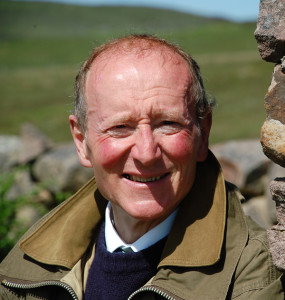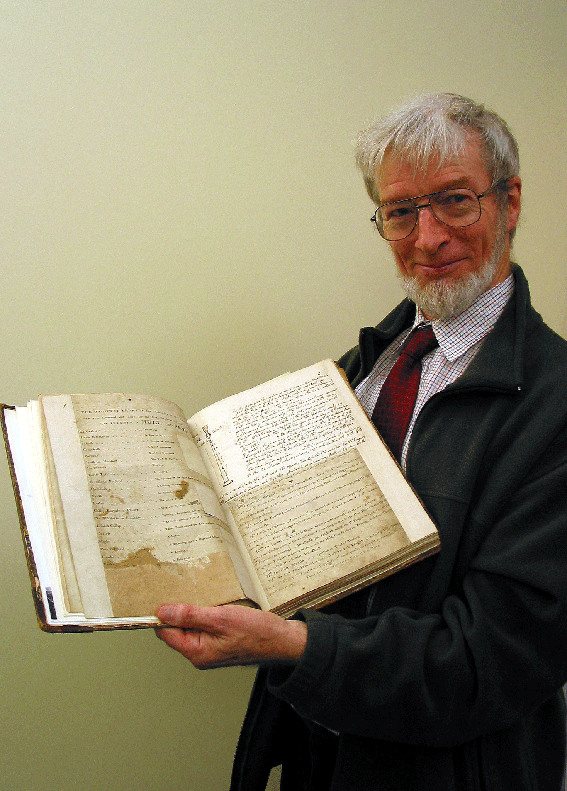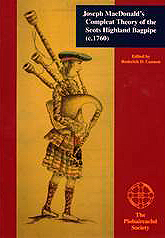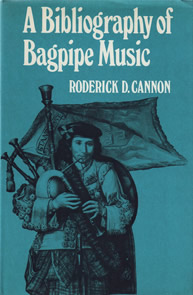John Angus Smith was the overall winner at the games held at the weekend near London. Adjudicator Roddy Livingstone: Re your report on Corby, the points regarding pipe bands / teaching etc. are well made and mirror comments of people like myself, Andrew Hall, Hugh Jamieson, Alan Beaton, Jimmy Banks, ‘Gabby’ Roe, Brian MacRae….. (the list goes on) over many years! The Scottish Piping Society of London is seeking to work jointly with the RSPBA (London & South of England Branch) to attempt to remedy this but, as the old saying goes ‘You can lead a horse to water…..’ etc! At the end of the day it’s down to the Pipe Majors.
Hunter Davies
Select your tune from the download box:
Open Piobaireachd
[wds id=”16″]
Professor Roderick Cannon
We are grateful to Professor Hugh Cheape and to Mr Alan Forbes for permission to reproduce this fitting eulogy to the late Roderick Cannon whose funeral took place last week in Norwich. Professor Cheape was unable to attend and Mr Forbes, Secretary of the Piobaireachd Society Music Committee, agreed to deliver this tribute in his absence:

‘Pibroch’ is not an easy subject but Roderick Cannon was its master. This was his chosen field of the music of the Great Highland Bagpipe and, more particularly, of the type of composition regarded as its ‘classical music’. In spite of the prominence of Ceòl Mòr – the ‘great music’ – in the received tradition, its origins are still obscure, its lines of evolution confused and its complexities ill-defined. Roderick dedicated a lifetime of scholarship to the unravelling of these complexities and his legacy is a more rounded and better founded appreciation of this music. As a distinct genre, Ceòl Mòr is a music of power and beauty but it is not for the faint-hearted; it is greeted with rapture by its aficionados and ‘disrapture’ or an air of mystification by the uninitiated. Roderick preached its significance and virtues with an ever-youthful enthusiasm, and his listeners were converted; and like any good apostle, he had very sound texts and he was their scribe.
Roderick was blessed with the mind both of a musician and of a scientist. He was not just scientifically inclined, but a researcher and teacher of distinction in his own academic sphere, attainments which we in the world of piping and his audiences in Scotland may have sometimes taken for granted. His PhD was their witness together with the credentials of a solid shelf of scientific titles and articles.
In terms of his scholarship in piping, his devotion to pibroch was exceptional and outstanding, and supported with constancy by his family. Music engenders debate but, in the twentieth century, debate about the bagpipe and its music was muted, a sometimes skin-deep consensus reflected in pipers playing the tunes according to a repertoire rescued and published by the Piobaireachd Society, founded in 1903. Any scholar entering this arena would want to return to their sources, search for evidence, establish premises for careful deduction and debate and ‘play’ or ‘sing’ their results. This was Roderick’s way, and the arena of his most important contributions was the Pìobaireachd Society and its Music Committee and Historical Committee of which he was a long-serving member.

He pursued their fundamental object of making available the tunes, known and less well-known, published or unpublished, and did so in a generously and scrupulously collegiate manner. He has added immensely to the body of music and our knowledge of it. Devotees of pibroch will understand that this is to simplify the story. This is an ancient tradition that appeared to be dwindling and part-lost by the end of the nineteenth century and the founding of the Pìobaireachd Society the response to this. Their well-meaning initiatives to re-circulate Highland bagpipe music led to a measure of confusion over notation and settings and Roderick was one of a small band who unpicked this and sought to explain. It was Roderick, pre-eminently, who returned to the sources, to identify and explore them systematically and thoroughly, and then to publish them.
The complexities of piping arose from the sometimes contradictory evidence of books, manuscripts, oral tradition and song. Symbolic of Roderick’s methodology and achievements are the editing of the manuscript collections of Joseph MacDonald, Donald MacDonald and MacArthur and MacGregor. The collection to which he probably dedicated most effort was the most complex – and the earliest.  Joseph MacDonald’s Compleat Theory of the Scots Highland Bagpipe is a manuscript manual written out by a young scholar and musician on the passage to India where he was to die of fever in 1763. Coming from the Manse of Durness on the very northernmost coast of Scotland, this was perhaps an almost inevitable fate. The manual’s survival and preservation in Edinburgh University’s Special Collections is another story, but a telling factor is that two or more versions of the manuscript had been published, adding to the difficulty of understanding the original.
Joseph MacDonald’s Compleat Theory of the Scots Highland Bagpipe is a manuscript manual written out by a young scholar and musician on the passage to India where he was to die of fever in 1763. Coming from the Manse of Durness on the very northernmost coast of Scotland, this was perhaps an almost inevitable fate. The manual’s survival and preservation in Edinburgh University’s Special Collections is another story, but a telling factor is that two or more versions of the manuscript had been published, adding to the difficulty of understanding the original.
When Roderick signed off his text and music scores in 1991, he commented that he had been working on the Compleat Theory for thirty years. This was long before I personally met Roderick in the 1980s but tells us what a store of detailed research now over fifty or sixty years lies behind these major volumes. Roderick’s fondness of reference to Joseph and his manuscript was much more than sentiment; he had had to try to get into the mind of the young musician on that ship to India, to understand how Joseph perceived the bagpipe and its music in his world of the mid-eighteenth century and how to explain its Gaelic culture to an Anglophone world. His depth of commitment is reflected in a thorough working knowledge of Scottish Gaelic and his fondness for his conversations over many years with Nan MacQueen from Sutherland.
 My introduction to Roderick’s work was being shown a typescript in the School of Scottish Studies in 1979 with the comment: ‘This is something different’, which indeed it was in a field notorious for its scant literature and quirky historical treatment. This was his Bibliography of Bagpipe Music, published in 1980 by the loyal publishing house of John Donald in Edinburgh. The Bibliography’s detail and thorough painstaking treatment of its subject was outstanding and, of course, immediately noteworthy by practitioners in the field of Scottish music. Its mission, to identify and locate all music printed for each type of bagpipe played in the British Isles and Ireland – Scottish Highland, English Northumbrian and Irish Union – was so abundantly fulfilled, each item including all editions and reprints noted with dates and authorship and with graceful acknowledgement of the one or two earlier attempts at bibliographies. Over more than thirty years research in the field of piping, I have only turned up one item not in the Bibliography and to claim that this was missed by Roderick would be disingenuous – this was an unknown third printing of Angus Mackay’s Piper’s Assistant!
My introduction to Roderick’s work was being shown a typescript in the School of Scottish Studies in 1979 with the comment: ‘This is something different’, which indeed it was in a field notorious for its scant literature and quirky historical treatment. This was his Bibliography of Bagpipe Music, published in 1980 by the loyal publishing house of John Donald in Edinburgh. The Bibliography’s detail and thorough painstaking treatment of its subject was outstanding and, of course, immediately noteworthy by practitioners in the field of Scottish music. Its mission, to identify and locate all music printed for each type of bagpipe played in the British Isles and Ireland – Scottish Highland, English Northumbrian and Irish Union – was so abundantly fulfilled, each item including all editions and reprints noted with dates and authorship and with graceful acknowledgement of the one or two earlier attempts at bibliographies. Over more than thirty years research in the field of piping, I have only turned up one item not in the Bibliography and to claim that this was missed by Roderick would be disingenuous – this was an unknown third printing of Angus Mackay’s Piper’s Assistant!
This was baseline research in which the assembling of the building blocks of evidence merited some publication in its own right. Another monument of this is The Highland Bagpipe and its Music, published in 1988 and continuously in print since. Given Roderick’s specialist study of the Highland bagpipe, this book had to be written. It is beautifully crafted, written principally for pipers but in no sense exclusive or dogmatic. In fact it serves also to explain the piper to the world!
The search for and forensic examination of sources has had a further outcome for future generations of players and scholars. Some of the earliest surviving manuscripts had had a chequered history, being discovered, lost and re-discovered – or not – and, in the course of Roderick’s career, most of the papers and music manuscripts identified were steered to the National Library of Scotland. I am not sure – because it seemed impertinent to ask – how influential Roderick was in cementing this alliance between the Piobaireachd Society and National Library, but I believe that he was the main or sole architect in our generation. He had earned the respect of the staff of the National Library and has subtly raised the profile and status of pibroch by consolidating it as national collection.
The world of piping and its study is unthinkable without Roderick. Consciously or unconsciously what we know now about piping in Scotland is owed to him. His mastery of the sources and impeccable scholarship is his legacy, and our memory is of a kind friend who understood and enjoyed to the full the fraternity that is Scotland’s piping tradition. In that it has its own ‘language’ and ‘symbols’ is reflected in another of Roderick’s very longstanding endeavours, the recovery and editing of the ‘Gesto Manuscript’, shortly to be published and exemplifying Roderick’s extraordinary dedication in searching out all possible sources for the music of the Highland bagpipe. I and others are the beneficiaries of long discussions of ‘Gesto’ and I shall miss our conversations, face-to-face or by ‘phone, more than I can adequately say. Our thoughts are with Elizabeth and Sarah and Martha who know too what Roderick has given to us over so many years.
Hugh Cheape, Sabhal Mòr Ostaig. 4 July 2015
[wds id=”17″]




















Recent Comments